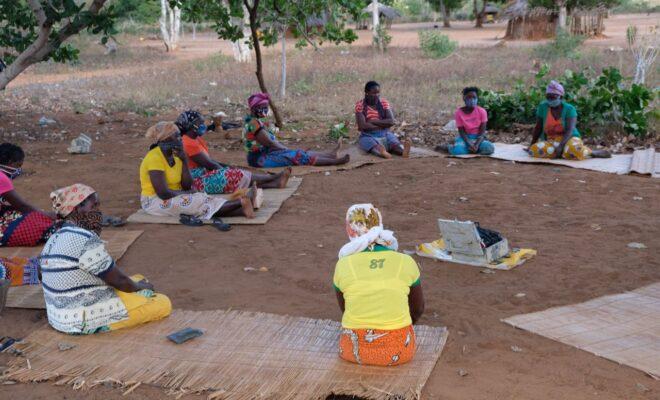
Debating Ideas is a new section that aims to reflect the values and editorial ethos of the African Arguments book series, publishing engaged, often radical, scholarship, original and activist writing from within the African continent and beyond. It will offer debates and engagements, contexts and controversies, and reviews and responses flowing from the African Arguments books.

Weekly meeting of a xitique group, a local money trust based system
We veer off the only concrete road that connects Mozambique from north to south and head down a dirt path, deeper and deeper into the bush. Over 700 km away from the capital, the population in the province of Inhambane is sparse. The landscape we pass through is dotted with a few spread-out straw huts, cassava plantations, and coconut trees; occasionally we see a group of children playing in the dry sandy earth.
In front of us, our destination: a group of twenty people sitting down on straw mats under the shade of a mango tree.
As we sit down, I immediately notice that the group, composed mainly of women, are all purposefully separated, adhering to social distancing guidelines. Almost all wear a mask or piece of fabric covering their mouth and nose made of the brightly coloured wax fabric capulana used in Mozambique.
As everyone introduces themselves, the mood is awkwardly solemn. A certain emptiness can be felt, not from the gaps of silence, but because the normal smiles and expressions have been hidden. Later, this will also be explained by the group’s miscomprehension of the disease and subsequent actions of the government.
The elected group president, Lourenço, timidly attempting to cover his mouth with the collar of his football jersey, introduces the group and the purpose of today’s meeting. This is the weekly meeting of a xitique group, where members save and loan money to one another on a trust-based system.
The savings begin. Three selected members sit in the centre of the circle; another member gets up and deposits or loans a certain amount of money; the money is withdrawn or deposited into a metal box; and the transaction is recorded on a paper booklet. This process is repeated until all transactions within the xitique group have been completed.
As this goes on, Anatercia, one of the older women in the group sitting beside the president, tells us that most here depend on subsistence agriculture, and the sale of firewood on the side of the main road for additional income. With poor access to markets, other economic opportunities are limited. Recently, these women have been left with a meager harvest due to the successive poor rainy seasons and ongoing water shortages. They are not the only ones: this year an estimated 1.6 million people in Mozambique face severe food insecurity. To make matters worse, the income earned from the sale of firewood has all but disappeared. This business relies on a steady stream of vehicles going down to the capital, Maputo, or further north to the tourist and fishing hub, Vilankulos; a stream that has slowed down, almost to a halt. After all, at the time of writing, this is the third month of the Covid-19 declared state of emergency.
Once the final transaction completes, the paper booklet is closed, the metal box where the money is kept locked, and the session abruptly ends. This was a quick meeting – there is little money to save or loan during this pandemic. The customary singing to mark the end of the session begins; all remain seated and stare down as a low-pitched melody wraps us in melancholy.

This encounter is strikingly different from previous ones that I have attended. Although many people in rural areas of Mozambique are living below the poverty line, there is always space for smiles and laughter. Before the pandemic, everyone would have gotten up, and started chanting, dancing, and clapping their hands together in a boisterous joy transcending language barriers.
After the song, the group is curious to know more about the future given the uncertainty in these times of Covid-19. Are we allowed to meet like this? How long will this last and what is next? Similar to the rest of the world, the general sentiment is one of confusion and anxiety about the uncertainty of the times to come.
Sadly, no one has concrete answers and we bid each other goodbye. Driving away while staring at the sparsely scattered plantations, it truly stuns me that the impact of the virus is felt in such a remote rural community, far away from city centres and in limited contact with the exterior world. Here, where news trickles down through word-of-mouth, local radio, and social media, the environment is ripe for disinformation, confusion, and fear.
Nevertheless, people have been quick to adopt the measures of the government, with very few acts of rebellion or negation of the existence of the disease, contrary to other parts of the world. This is perhaps linked to the fact that disease is ever-present in the day to day, whether it be malaria, tuberculosis, or HIV. In 2018, 54,000 people died from an AIDS related-illness, and the country has the third highest number of malaria cases in the world, as contrasted to the 21 deaths caused by the current pandemic.[1]
Knowing disease kills, people have not questioned the government’s prescription to wear a mask or wash their hands. Beyond this, savings groups such as this one have re-organized themselves, by defining specific times for each member to come and drop their savings, reducing the number of participants or even digitalizing their financial transactions.
The fear felt here is not due to the disease itself, but to the government’s banning of gatherings of more than 20 people such as this one and the opportunistic, violent actions by police forces. Further north in the province of Zambezia, Jorge, working with an NGO specialized in creating and supporting such groups in their initial phases, reports that members are afraid to meet as police are beating or bringing members to prison, regardless of whether they are respecting government rules. This has reached the point that people are afraid to sell their surplus produce in local markets. Actions like this will have repercussions for years to come, threatening to weaken the social fabric that insures the existence of this xitique group.

Ultimately, the longevity and efficacy of these self-organized co-operative funds are intrinsically tied to trust and self-accountability: the only guarantee being the social ties between members. Beyond these meetings, rural communities such as this one thrive on birthdays, weddings, religious events, or other special occasions to gather. Banning these events has strong repercussions for the social cohesion of these tightly knit communities. With the impossibility for the majority of the Mozambican population to follow the government’s “fica em casa” (stay at home), there is a need to recognize the socio-economic conditions of the 64% who live in rural areas and their capacity to act and adapt in the face of disease.
As the pandemic unfolds further, it remains clear there is an ever-more-important need to encourage and recognize these communities’ capacity for adaptation and resilience whilst planning, precaution and sensitivity are necessary from any external actors.
End Note:
[1]Numbers remain low, even looking at the positivity rate of tests. Infection rate per 100,000: Mozambique: 11; Malawi: 29; Zimbabwe: 40; Botswana: 58; Zambia: 60; Namibia: 200; Germany: 280; South Africa: 1038; Brazil: 1672; USA: 1706. Positivity rate of tests: Mozambique: 4%; Germany: 3 %; USA: 7 %; South Africa: 9 %; Ghana: 11 %; Nigeria: 17 %; Brazil: 32 % (https://www.worldometers.info/coronavirus/– accessed August 21, 2020).







Brillant, thanks !